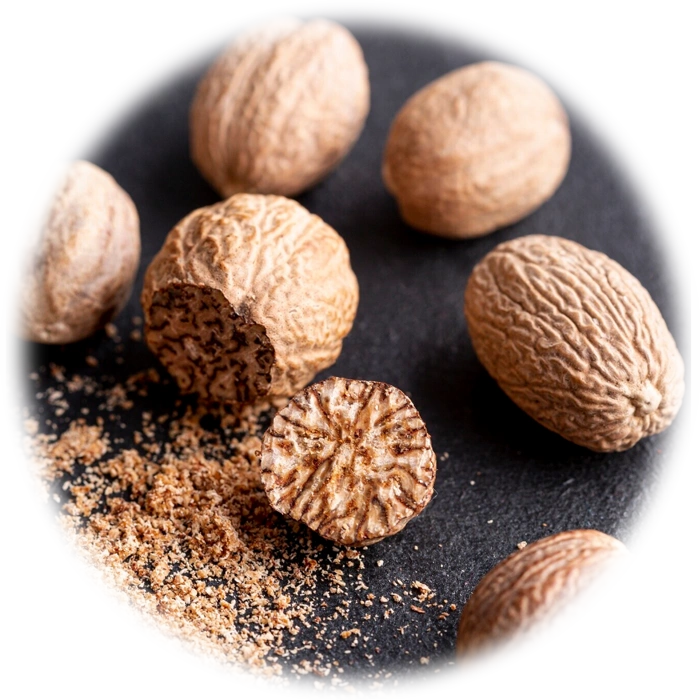Nutritional properties of Nutmeg
Energy :
None Kcal / 100g
Category : Spices & Sauces
Group : Basic Spices & Condiments
Composition And Nutritional Value :Nutmeg (Myristica fragrans) is a highly aromatic spice that is derived from the seed of a tropical evergreen tree. It is rich in essential oils, including myristicin, which is responsible for its distinctive fragrance and flavor. Nutmeg is a good source of dietary fiber and contains small amounts of various vitamins and minerals, such as vitamin C, vitamin A, B-vitamins (including folate), calcium, iron, magnesium, and potassium. While it is not typically consumed in large quantities, nutmeg's rich composition offers a variety of beneficial compounds for health when used in moderation.
Health Benefits :
Digestive Health: Nutmeg has been traditionally used to support digestion. It can stimulate the secretion of digestive enzymes, improve appetite, and alleviate issues like indigestion, bloating, and nausea.
Pain Relief: Nutmeg has natural analgesic properties and is often used in traditional medicine to relieve pain, particularly in conditions like arthritis or muscle pain. Its anti-inflammatory properties contribute to pain reduction.
Cognitive Function: The essential oils in nutmeg, particularly myristicin, have been linked to improved cognitive function. Some studies suggest that nutmeg may help in enhancing memory and preventing cognitive decline associated with aging.
Sleep Aid: Nutmeg is known for its calming and sedative effects. It has been used as a natural remedy for insomnia, as it can help relax the body and mind, promoting better sleep.
Antioxidant Properties: Nutmeg contains several compounds with antioxidant effects that help protect the body from oxidative damage, which is linked to chronic diseases such as heart disease, diabetes, and cancer.
Culinary Uses :
Nutmeg is widely used in cooking, especially in both sweet and savory dishes. Its warm, slightly sweet flavor makes it a common ingredient in baked goods like pies, cakes, cookies, and custards. It is also used in beverages, particularly in holiday drinks like eggnog, mulled wine, and spiced cider. In savory dishes, nutmeg pairs well with meats, sauces, and vegetables, adding a subtle depth of flavor. It is a key component in spice blends such as garam masala and is often used to flavor soups, stews, and curries. Nutmeg is typically grated or ground before use to release its full flavor.

